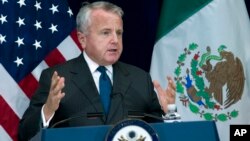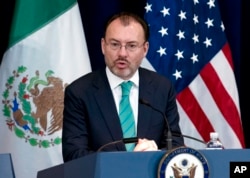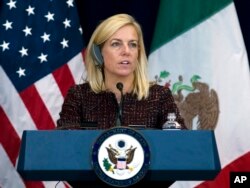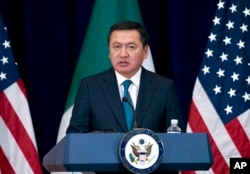Top U.S. and Mexican officials met at the State Department in Washington Thursday and agreed to increase their efforts to disrupt the deadly business of transnational criminal organizations (TCO).
Deputy Secretary of State John Sullivan said the illegal drugs TCOs peddle are taking an enormous toll on both sides of the U.S.-Mexican border, with more than 64,000 Americans dying from drug overdoses last year.
WATCH: US, Mexico Step Up Fight Against Illegal Drug Crime, Violence
Sullivan said the death toll from synthetic opioids alone claimed more lives than both heroin and prescription painkillers, and said close collaboration is the only way to track a problem that has no regard for international borders.
"This administration refuses to ignore the problem. The United States will no longer turn the other way or sweep this issue under the rug," Sullivan said. "That is why President [Donald] Trump has made a commitment to fight the opioid epidemic that has destroyed the lives of so many individuals and families throughout our country."
Mexican Foreign Minister Luis Videgaray said the sheer scope of the drug problem demands that the U.S. and Mexico work closely together to share information to disrupt TCOs and their lethal activity.
"Thousands of Americans die due to overdoses. Thousands of Mexicans die to the violence generated by illegal drug trafficking. And we will only be able to solve this problem by working together," Videgaray said.
Sharing criminal history information
U.S. Homeland Security Secretary Kirstjen Nielsen announced that she and Mexican Interior Secretary Osorio Chong signed a memorandum of cooperation Thursday to provide Mexico with the U.S. criminal history of repatriated Mexicans.
"The agreement we will sign today will transition to a biometric-based platform, so that ICE [Immigration and Customs Enforcement] can share biometric data, notice of more than 350 conviction codes, and any known gang affiliations with our Mexican counterparts and partners," Nielsen said.
During the 2016 U.S. presidential campaign, then-candidate Trump forcefully vowed to tackle what he and others have called an opioid epidemic. He promised more resources for opioid addiction treatment and to stem the flow of illegal drugs coming across the U.S. southern border with Mexico by building a wall and empowering law enforcement officials.
At Thursday’s news conference, reporters asked if Trump’s proposed border wall and his threats to pull out of the NAFTA trade agreement impaired security cooperation.
Videgaray and Osorio both said Mexico would always work with the U.S. to combat transnational criminal organizations to help save lives on both sides of the border.









